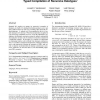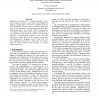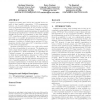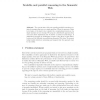116 search results - page 7 / 24 » Tuple-based abstract data types: full parallelism |
TLDI
2003
ACM
14 years 20 days ago
2003
ACM
Standard ML employs an opaque (or generative) semantics of datatypes, in which every datatype declaration produces a new type that is different from any other type, including othe...
HPDC
1993
IEEE
13 years 11 months ago
1993
IEEE
Building the hardware for a high-performance distributed computer system is a lot easier than building its software. In this paper we describe a model for programtributed systems ...
SP
2008
IEEE
13 years 7 months ago
2008
IEEE
Abstract. Understanding the functioning of a neural system in terms of its underlying circuitry is an important problem in neuroscience. Recent developments in electrophysiology an...
PPOPP
2012
ACM
12 years 3 months ago
2012
ACM
Graphics processing units (GPUs) are powerful devices capable of rapid parallel computation. GPU programming, however, can be quite difficult, limiting its use to experienced prog...
ESWS
2010
Springer
13 years 11 months ago
2010
Springer
Abstract. The current state of the art regarding scalable reasoning consists of programs that run on a single machine. When the amount of data is too large, or the logic is too com...




